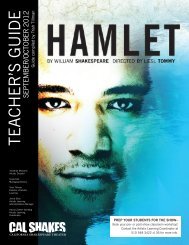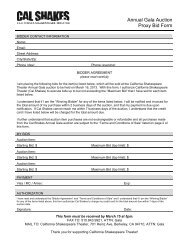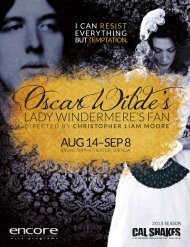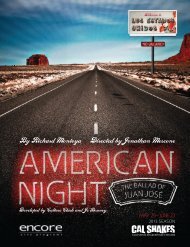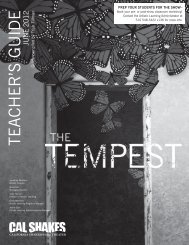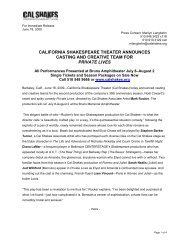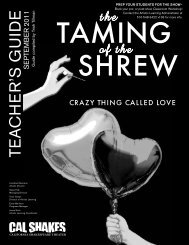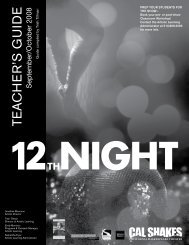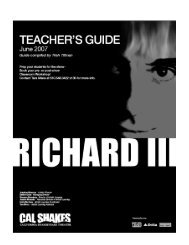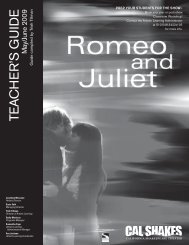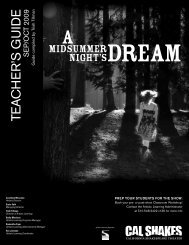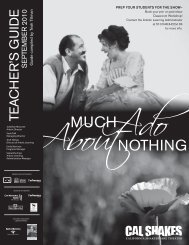Read Spunk Program - California Shakespeare Theater
Read Spunk Program - California Shakespeare Theater
Read Spunk Program - California Shakespeare Theater
Create successful ePaper yourself
Turn your PDF publications into a flip-book with our unique Google optimized e-Paper software.
THREE ENCOUNTERS WITH<br />
WHEN<br />
Zora Neale Hurston<br />
started writing in the<br />
1920s, she wanted to<br />
represent how rural societies lived, how they felt and loved<br />
and sought revenge. She set her short story, “<strong>Spunk</strong>”—a<br />
tale of lust, killing, and supernatural vengeance—in the<br />
Deep South. The basic premise of the story is that a<br />
man desires the wife of another man, and kills him so<br />
as to marry her. Published in 1925, <strong>Spunk</strong> was awarded<br />
second place in an event staged by Opportunity magazine,<br />
a publication founded three years earlier to support the<br />
work of Harlem Renaissance writers and artists who gave<br />
visibility to black culture, exposing its complications rather<br />
than seeking to eradicate them. Hurston was 34 at the<br />
time, and she would, over a 30-year career, publish four<br />
novels, two books of folklore, an autobiography, numerous<br />
short stories, and several essays, articles, and plays.<br />
“Grab the broom of anger and drive off the beast of<br />
fear,” was the call to action from Hurston, herself a<br />
striking presence in any room, being assertive, funny,<br />
and verbally dexterous. She did grab the broom, and the<br />
dust it stirred up fl ew right out into the faces not just of<br />
white people who discounted black voices, but also of<br />
those who wanted to depict blackness as victimhood.<br />
The picture she painted of black rural society, some felt,<br />
was inappropriately discourteous about social ethics and<br />
behavior, and disdainful in its use of colloquial dialect.<br />
This woman—who’d gone back to school at the age of 26,<br />
claiming to be, and passing for, a 16 year-old(!), and had<br />
earned both a bachelor’s and a master’s degree—was, they<br />
BY RESIDENT DRAMATURG PHILIPPA KELLY<br />
felt, condescending to her less fortunate rural brothers and<br />
sisters. But Hurston weathered this criticism and thrived<br />
on the controversy, establishing an academy for black<br />
performance, winning a Guggenheim Fellowship, working<br />
with anthropologists Margaret Mead and Ruth Benedict,<br />
and writing extensively on voodoo through what she called<br />
“the spy-glass of anthropology.” She researched songs,<br />
dances, tales, and sayings, and much of her focus was on<br />
slavery and the time period immediately following it.<br />
Despite, or perhaps because of, Hurston’s success, in the<br />
1940s she had to face the horror of a false accusation (of<br />
molesting three young boys) made by a supposed friend.<br />
Although she was cleared, Hurston never fully recovered<br />
from the effects of this betrayal and scandal. In 1950, at<br />
the age of 60, she took a job as a maid until she could<br />
afford to begin writing seriously again. But she suffered two<br />
strokes, and in 1959 she died of congestive heart failure<br />
at age 69.<br />
One of the reasons that Hurston didn’t “live on” during the<br />
decades after her death was that she didn’t write in explicitly<br />
political terms in the “protest tradition,” as did Ralph Ellison,<br />
for example, or Richard Wright; and because her controversial<br />
views—such as her belief that segregation is positive because<br />
it sustains black values in a way that integrated classrooms do<br />
not—refused “progressive” models of race and equality.<br />
ALICE WALKER REDISCOVERS ZORA<br />
It wasn’t until 1975, 15 years after her death, that she<br />
reemerged on the public stage, thanks to Alice Walker’s<br />
encoreartsprograms.com 15



